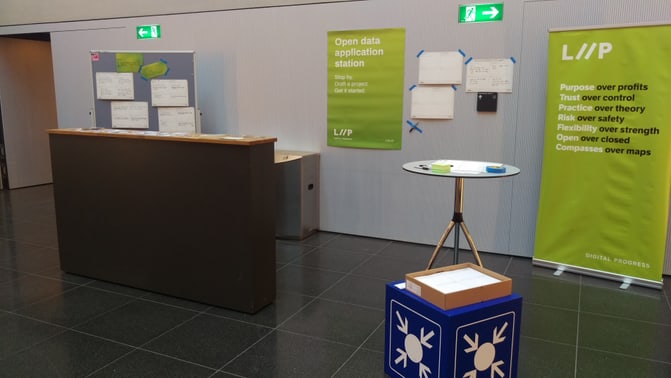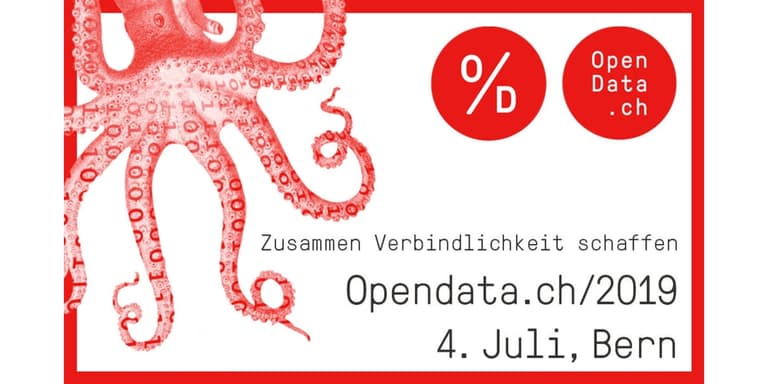(Source: https://opendata.ch/projects/2019/)
What is open data?
Open data is by definition data that is provided to the public without copyright restrictions.
Here are some features that might help you to understand where open data is coming from:
- Open data is mostly of statistical data.
- It is not personal data because privacy would otherwise be at stake.
- "No copyright restrictions" means that open data is usable by both the private and the public sectors without asking for permission.
- One key feature is its interoperability: open data should be easy to mix and operate on so that app builders can make good use of it.
(Source: http://opendatahandbook.org/)
What is Opendata.ch?
Opendata.ch is the Swiss branch of the Open Knowledge Foundation. Open Knowledge Foundation is a global non-profit organization focused on realizing open data's potential for society.
Opendata.ch helps to drive the open data movement forward in Switzerland. They organize events and focus groups. Opendata.ch 2019 was one such event: it is the yearly happening unconference for open data in Switzerland. Opendata.ch also organizes other such events throughout the year. Many of them specialize in a certain aspect regarding open data, such as energy or "hacking" for example. See here for a list of their upcoming events.
This year it was an open conference
In the years before the conference had been organized as a bar camp with scheduled talks. But this year it came as an open conference.
That means no prepared talks but the community chooses on the spot the topics they want to discuss. The organizers then provide space and time for each chosen topic and offer it as an unstructured workshop. They facilitate the discussion and write a protocol.
This how I experienced this format:
The open conference format made it harder for me to catch up on the general ideas
I had come to the conference to get an overview of the topic of open data. But that was hard to get if everybody newbies and experts alike all get the same vote on topics.
In the beginning, we went through a process of pitching to each other our topics of interest. But in the end, it was unclear to me why certain topics made it to the top and others did not. Was this because they were central to the open data movement or did they just rise out of general public interest in them?
Take data privacy for example. It turned out to be quite a topic in the community, but private data is normally excluded from open data, so was that topic relevant here? I am still not quite sure about this.
The quality of the workshops I attended differed a lot. It all depended on who attended them. In some workshops a vivid discussion started with many different stakeholders gathered around a table bringing together a variety of perspectives. In other workshops, nobody including me had much experience and the topic at hand got barely off the ground.
The open conference format facilitated networking
Since the participants were in constant discussion with each other it was easy to make contact. Most people at the conference were professionally involved in the field of open data and I enjoyed it very much talking to them and getting a first-hand impression about what they care about and what challenges they face in their daily work.
I also enjoyed the high level of energy that lasted until the late afternoon right to the end of the conference. Since we were all actively participating, there was no room for feeling sleepy in late afternoon talks, something that I had experienced in some other conferences, where you can easily reach the point of being overwhelmed by too much new information.
The conference format helped the organizers but left gaps for me
The organizer told us that they had chosen this format of an open conference since they wanted to find out what the community needs. This is honorable. And given that most participants worked in the field, I think choosing this format was a good choice overall.
But for me personally, it left a lot of gaps in my knowledge. Therefore I am dividing the rest of this article in two sections:
- The impressions that I got during the conference
- My research afterward filling my gaps regarding the state of open data
My impressions at the conference
Here are some direct impressions on the event:
The community around open data is growing nicely
The community seems to have grown a lot. We were around 150 participants, most of them professionals working on either the data provider or the data consumers side. Open data used to be a grassroots movement. It is beyond that stage now and has become mainstream.
SBB was an impressive host
I was impressed by the initiative of the SBB to host the event. I also liked the keynote delivered by its CEO Andreas Meyer. He gave me the metaphor of the data lake. That picture sticks with me ever since. I feel it captures well the relationship between data providers and app builders. Open data should be like a lake, where app builders can float on:

Open linked data and the Semantic Web
In one of the workshops, I learned about Lindas the Linked Data Service of the Swiss e-government. I also later learned from my colleagues that we as Liip were involved in this project.
The workshop got me interested in the topic of Linked Data and The Semantic Web. During the workshop, I was not sure whether this was a new topic, but I learned later that the idea of the Semantic Web had been around since about 2008. Even though the idea is old, it remains a topic today putting this into practice. Swiss e-government is still constantly expanding, see for example this study here from May 2019: Nationale E-Government-Studie 2019.
Data privacy was an important topic
Even though open data is generally not personal, data privacy was none the less an important topic at the event. Among the workshop topics were "Why are income data not open data?" or "How to better protect personal data?". To me, that reflects the discussion in the mainstream today, where the protection of data privacy has become an urgent issue.
The focus on data and meta data quality
I learned that providers of open data take great pride in the correctness of their data. There was one story about the recounting of parking spaces, after a complaint. Overall the focus has shifted from quantity to quality of open data. And data quality is especially about the quality of metadata that tells app builders how reliable the data source is.
Data apps are in high demand
I observed a huge interest in data applications not only by app builders but also on the data provider side. Data providers care about what can be done with their data and how to best support app builders. In the workshops, the need for more communication between these two sides was expressed. That might be a future task of the Open Data Association to act as a middleman between data providers and data consumers and provide space and time for them to connect. The conference itself might have helped in that regard.
Liip's recipe for smart applications
Liip had a stand in the Aula, where we introduced our recipe for smart applications to the community. The method helps to quickly evaluate ideas for open data apps. There was a lot of interest regarding this, so much that we decided to write an extra blog article on the topic:

Fairtiq the smart public transportation ticket
One of the keynote talks was given by Gian-Mattia Schucan the founder of Fairtiq. Fairtiq is a public transportation app. It relies on open data and also has set up contracts with transportation providers. It makes buying a public transportation ticket in Switzerland as easy as getting in your private car. You just swipe twice to start and end the ride. Payments are then deducted automatically, always choosing the cheapest option for the whole trip. Since we as Liip were involved in this, we have also a blog post about Fairtiq, were you can read more about the project.
On the state of open data
The conference format made it hard for me to see where Open Data stands today. Therefore I continued my research afterward. To conclude this article I will share with you just some of my insights:
How does Switzerland compare globally?
So one of my questions was: Are we leading the way regarding open data in Switzerland or are we rather catching up? A good source to answer that question is the Global Open Data Index. Switzerland is currently on rank 47 with 36% of its data open.


Semantic Web and Artificial Intelligence: how are these topics connected?
- The Semantic Web was a hot topic in 2009. The idea was to have the Semantic Web as a giant search engine of Open Linked Data, see for example this Ted talk by Tim Berners Lee in 2009.
- Linked data has become mainstream today with RDF as its leading data format that is used in open data catalogues worldwide.
- The Semantic Web has not taken off as much as it was anticipated. Artificial Intelligence does not depend on it, but comes with many tools today to digest and merge data in whatever format they are given, see for example this article here on how the web has developed since 2009: Sematic Web is dead long live the AI.
- On the other hand, this article here argues that the idea of the Semantic Web is a theoretical ideal that has paved the way to many other innovations in which it sort of lives on and keeps inspiring us The Semantic Web where is it now?
Thanks for reading so far
See you at the next open data conference!

